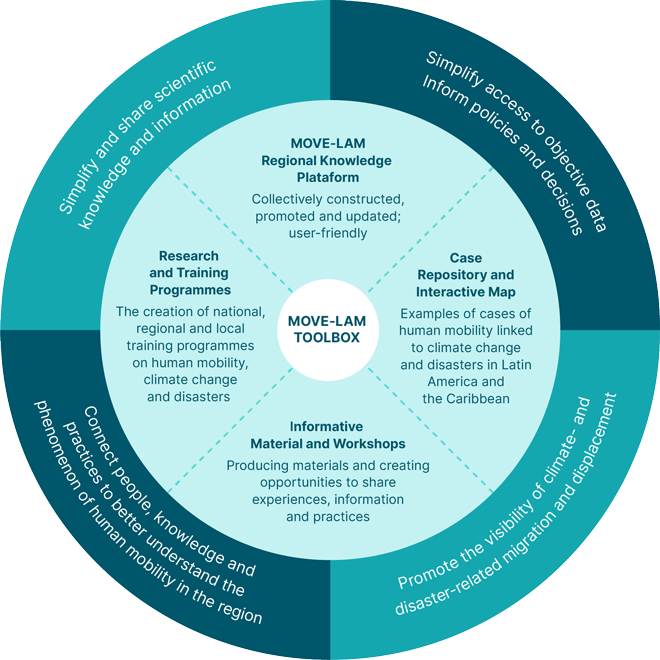How we work
On the creation of the Observatory: a look at the recommendations of global agendas
- Human Mobility
- Forced Displacement
- Climate Change
- Disasters
Human Mobility
At the Observatory, we believe that the production and collection of information and the monitoring of the phenomenon through regional structures can facilitate the task and allow for more focused work on the needs and specificities of the region. In this regard, the Global Compact for Safe, Orderly and Regular Migration (2018) proposes the creation and strengthening of regional migration observatories to collect and analyze data with the aim of establishing common strategies.

Forced Displacement
For its part, the 2018 Global Compact on Refugees calls for the establishment of a global academic network on refugee, other forced displacement, and statelessness issues, involving universities, academic alliances, and research institutions, together with UNHCR and other relevant stakeholders.

Climate Change
The Task Force on Displacement (TFD) of the United Nations Framework Convention on Climate Change (UNFCCC) proposes enhancing research, data collection and the sharing of information to better map, understand and manage human mobility related to the adverse effects of climate change.

Disasters
Both the Sendai Framework for Disaster Risk Reduction (2015-2030) and the Global Platform for Disaster Risk Reduction (DRR) 2019 recommend the collection, analysis, management, use and dissemination of data and information. They also propose user-friendly regional systems and services for the exchange of information and the coordination of networks and scientific research institutions.

Our three main pillars of action
Mapping and research
- Map and collect available data and information. Produce data to build and feed a digital regional platform on human mobility in the context of climate change, with input from Observatory partners and collaborators, through ‘thematic factsheets’.
- Help create a new network of researchers, research centres, observatories and other actors involved in the field of human mobility and climate change through the mapping of these actors and the creation of spaces for dialogue and training. Promote and encourage research and scientific production in Latin America and the Caribbean, as well as foster scientific production through research projects, publications, reports, etc.
- Stimulate and contribute to the development of innovative and participatory research techniques and instruments.
Development and strengthening
- Provide knowledge to develop and strengthen regional governance of human mobility driven by climate change and environmental degradation.
- Map actors, practices, instruments and legal and/or policy mechanisms to address environmentally motivated human mobility in the region.
- Provide support, through information and data, for the participation of actors in decision-making forums and regional and international meetings.
- Contribute to the creation of a network of observatories in the region focusing on dimensions of the topic (e.g. climate change, disasters, food security, migration, human rights, etc.)
Training and Information
- Promote spaces and mechanisms for the exchange and dissemination of scientific information (e.g. courses, seminars, workshops and other events).
- Facilitate the training and capacity-building of governmental, civil society and private-sector actors through training courses and the drafting of practical guides, thus contributing to the creation of networks of ‘experts’ in the field.
Toolbox
Putting ideas in motion: our proposal in action
Transforming the Observatory into a platform for collaboration by developing tools that enhance synergies and collaboration among many different actors in the region.


